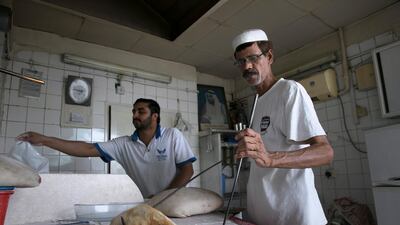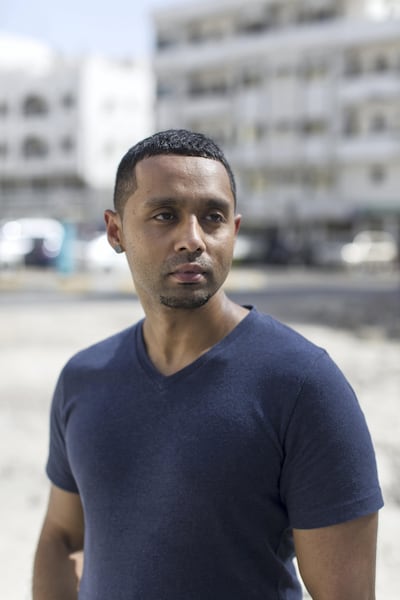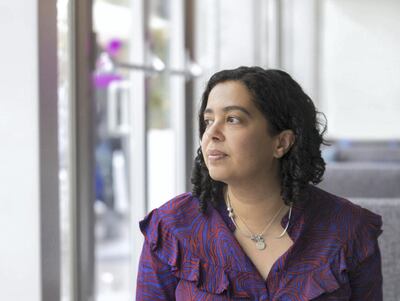Where can you get the best bread in Abu Dhabi for Dh2 or less? Where is the best place to eat Ugandan or Ethiopian food? Do you have what it takes to find fresh coconut water from Kerala, or are you only able to find the sort that comes from Sri Lanka?
For the writer Deepak Unnikrishnan, who grew up on Abu Dhabi’s Hamdan Street, such questions are more than a matter of taste, memory or nostalgia, they’re one of the key techniques he uses to entice his students beyond the confines of New York University Abu Dhabi’s (NYUAD) Saadiyat Island campus.
"It's more like a ruse to allow people to think they know what the class is about when really they don't. I give them what some people might say are strange assignments or what others might call a scavenger hunt, but really food is a way for me to get my students to think about what Abu Dhabi is all about and to get them into the city," the writer says of Street Food, the semester-long course he runs as part of NYUAD's first year writing seminar.
"They often get lost and that's intentional, because I want them to be confused and to ask for directions – that's a part of the whole concept because they have to figure things out for themselves."
In the context of Unnikrishnan's course, food becomes less a series of ingredients and recipes, and more a tool for exploring an unfamiliar city, one that not only provides a sense of welcome and a way in but also allows them to develop a sense of place and ultimately, belonging.
"When you think of food, you think of people eating, but you also think of people breaking bread and figuring out what to talk about," explains the author of Temporary People, the award-winning ode to non-resident Indian life in Abu Dhabi that was published at the end of last year.
"My students come back and tell me what they think the city is now and I tell them what it used to be, and then we both try to fill in the gaps. You could call it an act of preservation, if you like, but it's not quite there yet," Unnikrishnan explains.
Bound up as it is with notions of locality and identity, memory and home, the writer's approach to food chimes with the one proposed by curator Hammad Nasar, who commissioned Unnikrishnan to write for Rock, Paper, Scissors: Positions in Play, the book that accompanies the UAE National Pavilion at this year's Venice Biennale, which is running until November.
Alongside chapters that include Osman Samiuddin's history of cricket in the UAE, Reem Fadda and Maisa Al Qassimi's investigation into the social clubs and societies that act as a bulwark against loneliness and isolation, and WTD Magazine's mapping of informal "gamescapes", Unnikrishnan contributed six stories to the volume, none of which specifically addresses food but each of which is playful in its own way.
Gulf Return describes the fantastical escape of workers from the UAE on board a stolen airplane, is printed on paper that also contains markings and construction lines that allow it to be turned into a paper aeroplane while Eulogy 1 is partially obscured by silver scratch panels, like a scratchcard, which have to be removed if the reader wants to see the whole narrative.
"This project is about thinking about home not just in terms of the passports we carry but also about the stories we share, the songs we sing, the games we play and the food we eat," Nasar told me in January, at the time of his official appointment as curator of the UAE's National Pavilion.
"And when you start thinking about that in the context of the UAE, where 85 per cent of people are not necessarily carrying an Emirati passport, it begs bigger questions around home and belonging."
Nasar's interest in playfulness, and the way it infuses modern and contemporary art in the UAE, stems from the time, in 2007, when he was helping the curatorial team at that year's Sharjah Biennial with their final preparations.
On the last day, the Emirati artist Mohammed Kazem gave Nasar a book called Window: 16 UAE Artists, about a show he had curated the year before, and when Nasar had a chance to look at it, he was taken by what he saw. Inside was a proposal by the Khorfakkan-based artist Mohammed Ahmed Ibrahim to cut a hole in a mountain, and examples of Kazem's own work in which he was using his tongue to explore objects such as locks, pipes, holes and even scissors.
"This is not what I thought art from the UAE might be, and the experimentation and playfulness stayed with me," Nasar said.
"For me, making exhibitions is about trying to answer questions. I wanted to know where this playfulness was coming from, how it was being nurtured and finally, what does play do?"
What Nasar describes as his final "Kerching! moment" only came later, when he was moving back to London with his family after a period working in Hong Kong. As soon as they arrived home, his youngest son immediately set off to unpack his toys and play with a young neighbour.
"That was when I realised that play is a crucial part of making a place home," the curator explained.
Nasar has always described Rock, Paper, Scissors: Positions in Play as a project with three strands or sites. Firstly, there is the pavilion itself. Housed in the Sale d'Armi of the Arsenale in Venice, it features the work of five UAE-based artists: the poet and filmmaker Nujoom Alghanem, Sara Al Haddad, Lantian Xie, Vikram Divecha and Dr Mohamed Yousif, a sculptor who was also chair of Sharjah's National Theatre.
Secondly, there is the book, which stands as a kind of exhibition or artwork in its own right, thanks to the commissions from Unnikrishnan and the Dubai-based art trifecta Ramin and Rokni Haerizadeh and Hesam Rahmanian. The third strand, described by Nasar as an ongoing conversation, is a public programme, Food | Music | Sports, curated by Dubai-based artist and writer Hind Mezaina. This is all about bringing the pavilion back home and reaching out to people in the UAE who couldn't make it to Venice.
The first event in the programme begins on Saturday when Mezaina and Unnikrishnan will meet at Meylas, a restaurant in Abu Dhabi's Al Raha Beach district that specialises in Emirati dishes such as machboos, chbaab pancakes, sweet mohalla flatbreads and balaleet, the sweet noodle and omelette dish.
The discussion will then be followed by a screening of a documentary, Soul Food Stories by Tonislav Hristov, also curated by Mezaina in collaboration with Cinema Space at Manarat Al Saadiyat, that explores the power that food has to bring people from disparate communities together.
As a venue for talking about food, identity and home, Mezaina explains, Meylas restaurant is particularly appropriate. "I chose Meylas because of the way it tries to recreate a sense of home by serving the kind of recipes you might encounter in an Emirati kitchen," the artist and writer tells me.
"For a long time, if you wanted to eat machboos, for example, as a non-Emirati, you had to be invited into an Emirati home. Even as an Emirati the idea of going out to eat Emirati food just wasn't available, so when I found out about that place I thought: 'OK, what does that mean to create a sense of home in a restaurant?'"
For Mezaina, an artist whose main focus is popular culture, especially film and music and the way these have defined her own notions of home and sense of self, the relationship between food and identity is one of the wider issues that emerged from Rock, Paper, Scissors: Positions in Play, even though it wasn't explicitly addressed in either the pavilion or the book.
"In a country like Italy, it's a given that you will go out and eat Italian food as well as eating traditional Italian dishes in Italian homes, but that's not so much the case here, [where] you can go out and experience Emirati cuisine. So what does that mean in a place like the UAE and Abu Dhabi more specifically?" she asks.
"We thought about doing the first event as a food tour but I didn't want to fetishise the experience where you end up turning up as a group of outsiders and objectifying the people and the spaces," Mezaina insists.
For Mezaina, encountering Emirati cuisine in a commercial space like Meylas also moves the encounter with the food and the culture beyond the only other venues in which they are normally consumed in public. "When people talk about Emirati food it's often spoken about in terms of heritage as opposed to a day-to-day thing. You normally have to wait for a national holiday to experience it," she explains.
As with Mezaina's other work, which has explored the role that pop culture played in the life of Khaleejis of her generation, who grew up between the 1970s and the 1990s, and the representation of Khaleeji women and the Gulf in general, the Food | Music | Sports programme provides an opportunity not just to respond to the UAE National Pavilion, but to explore a cosmopolitan culture that is often misrepresented and misunderstood.
"It's about having a voice that explains that there's an interesting mix here that shouldn't be devalued and that this mix is something that was pretty unique to the Gulf and that helped to make a lot of people here richer in terms of their knowledge and understanding and empathy."
Food | Music | Sports will include panel discussions and film screenings across Abu Dhabi, Dubai and Sharjah. To register for the free-to-attend Food event in Abu Dhabi on Saturday, September 16, visit http://bit.ly/npuae-food
_______________
Read more:
Hidden food gems: Taste of Ethiopia is a quaint spot offering delicious fare
Our alternative restaurant guide: Abu Dhabi favourites
Our favourite expat foods and where to find them
_______________



